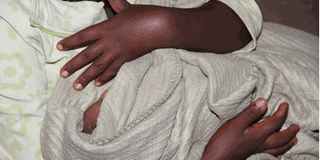Ballooning cases of SGBV, child neglect raise concern

A 12-year-old girl who was defiled and impregnated in Uasin Gishu County in 2014 cuddles her baby. Defilement cases are on a new high during the Covid-19 lockdown. Photo | Nation Media Group
Authorities in Migori County have raised concern over ballooning cases of Sexual and Gender Based Violence (SGBV) and child neglect.
Migori County Director of Children Services John Odinya and his Gender counterpart Agnes Awinja said the rising trend has resulted into increased poverty rates in the county.
They said low income occasioned by job losses during the Covid-19 pandemic has worsened the situation with families, including children, forced to stay at home.
The officials want Migori County Assembly to enact a legislation that will scale down the cases.
Already, County Gender executive Samson Ngariba has enacted a Sexual Gender Based Policy which will be presented when the county assembly reconvenes in February.
The policy seeks, among other things, to give a lifeline to victims of SGBV by making available reporting desks and well-trained staff to assist the victims.
Post-trauma care
“We expect the county legislators to draft a gender bill from the policy document and help provide a lasting solution to the menace,” said Ms Awinja.
She noted that the gender desks, which will be manned by personnel well trained on counselling, will also provide post-trauma care for survivors in the county.
“The Covid-19 pandemic had led to an increase in incidences of SGBV in the county mostly carried out by family members. Most of these cases are experienced in informal settlements where there is little exposure,” she said.
She pointed out a case in which a middle-aged man was accused of beating up his wife before shaving her hair using a panga. The man has since been arrested.
“The case at hand is one of the many sexual and gender-based violence acts that go unreported due to lack of proper reporting mechanisms and insufficient data management system necessary to locate the survivors,” she added.
Nominated MCA Esther Onana said persons living with disabilities were suffering in silence, afraid to report the numerous SGBV incidents.
She faulted police officers for not doing enough to respond to cases despite having a gender desk at various stations.
“I have been handling several cases involving young girls and married women who say police have done little despite getting reports. I would encourage law enforcement to accord maximum support to SGBV victims,” noted Ms Onana.
The numbers
Data released by Children Protection Information Management System (CPIMS) revealed that 2,944 persons in the county had suffered SGBV between 2019 and 2020.
Of the 2,944, 1,386 were males while 1,558 were females.
Statistics by the World Health Organisation (WHO) further indicate that 66 per cent of girls and boys aged below 18 years have either experienced physical or sexual violence.
Moreover, 44 per cent of women and girls between the ages of 15 to 49 have either gone through physical or sexual violence.
Meanwhile, the Children's Department has attributed the rise in street children to neglect by parents and orphanhood.
Speaking during county public participation on the National Draft on Rehabilitation of Street Families, Mr Odinya called on the government to develop a plan to sustain abandoned and orphaned children to address the issue.
“Unless the government and relevant partners develop sustainable programmes, Migori County urban centers will soon be overwhelmed by a number of poor and vulnerable street families,” warned Mr Odinya.
Huge allocation
He revealed that Migori County is among the top counties getting a huge allocation of National government funding for the orphans and vulnerable families but not all of them are beneficiaries due to the increasing number of needy persons.
Ms Pamela Masese, an official from Street Families Rehabilitation Trust Fund (SFRTF), said more than 700 street children and families in Migori County are “a worrying number which should be intervened by all the government and other key partners".
Ms Masese said the draft policy on rehabilitation of street families will guide Faith-Based Organisations and Civil Society Organisations engaged in rehabilitating street families on legal and safe practices while handling vulnerable families.
She said the government is deeply concerned about the plight of street families and it was the reason why SFRTF was initiated.





